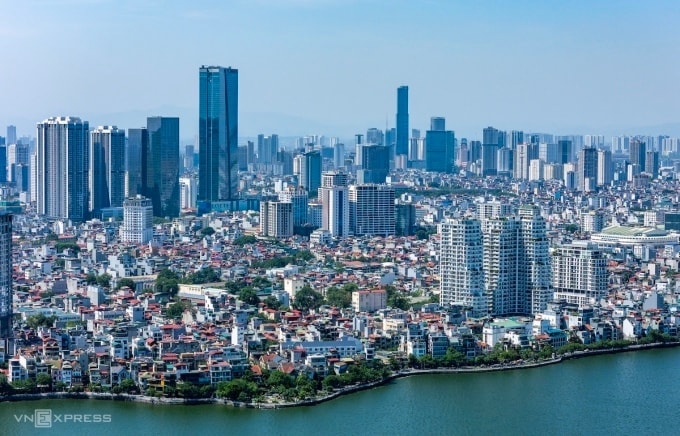The National Assembly's monitoring delegation recommended the early promulgation of a tax policy applicable to people who own many houses and land and abandon real estate.

Today, the National Assembly discussed in the hall the report of the supervisory delegation, the draft Resolution on management of the real estate market and social housing for the period 2015-2023.
According to the monitoring team's report, tax is a medium and long-term solution to help the real estate market develop sustainably. The monitoring team recommends that the Government soon study and promulgate a new tax law, including imposing high taxes on those who use many houses and lands, or who are slow to use or abandon land.
The monitoring delegation also noted that tax policies must ensure the goal of income redistribution, creating reasonable revenue sources for the budget based on international practices, in accordance with Vietnam's socio-economic conditions. The government also needs to complete the national database on property registration to integrate with the registration system of other fields.
The recommendation of the National Assembly Supervisory Delegation was made in the context of the real estate market having existed for many years with unreasonable product structure, causing an imbalance between supply and demand.
Looking back at the period 2015-2021, according to the report, the real estate market has developed vigorously with many new types such as tourist apartments (condotel), resort villas, officetels... Condotels and officetels alone have nearly 100,000 units appraised by the Ministry of Construction and tens of thousands of units appraised by localities. By 2021, the whole country will have about 5,000 projects, with a total investment capital of more than 4.5 million billion VND.
The supply is abundant but mainly projects invested in the previous phase, targeting the high-end segment, while few products are suitable for the income of the majority of people. At the end of this phase, most types of tourism and accommodation real estate are facing legal problems.
By 2022-2023, the real estate market will decline, businesses will face many difficulties. Supply will decrease sharply compared to the previous period, causing real estate prices to skyrocket compared to income growth. Typically, Hanoi and Ho Chi Minh City no longer have apartment segments with prices suitable for the income of the majority of people.
Statistics show an increasingly large gap in the structure of real estate products. According to a report by the Hanoi People's Committee, the mid-range and high-end apartment segment accounts for the majority. For example, in 2022, apartment prices increased sharply but the number of transactions was low, only about 10% of products offered on the market. Individual houses also remained high and had almost no transactions.
In Ho Chi Minh City, real estate prices are increasing "out of control", causing an imbalance between prices and values, leading to a sharp decline in transactions. Most housing projects are stuck and stalled, causing waste of land. This increases difficulties and costs for investors, causing product prices to escalate.
This period also recorded a large number of housing projects facing difficulties and delays. According to the Government's report, Hanoi has 404 projects facing difficulties, of which nearly 40% have been resolved. In the past 2-3 years, the development of real estate projects in the capital has been very slow, with almost no new projects approved. Many projects that were started in the previous phase have also been slow to implement and have had to adjust their progress.
Similarly, Ho Chi Minh City has 220 stuck projects, 35% of which have been resolved. The city has 30 projects that have stopped construction (18,800 apartments, nearly 2,900 individual houses) and 56 projects that have not been constructed.
The market has an excess of high-end housing while affordable housing and social housing - the segment for workers and low-income laborers - are in short supply due to slow implementation. Most localities have not yet completed the target for social housing development according to the project to build one million social houses. For example, Hanoi has achieved 9% of the target, while Ho Chi Minh City has about 19%.
Previously, the Ministry of Construction also proposed a housing tax to address the situation of rising housing prices and a market dominated by speculators. This proposal was later supported by the Ministry of Finance, but some experts said that taxing would push up housing and land prices. However, according to the Ministry of Construction, the tax policy does not increase housing and land prices, but on the contrary, helps limit speculation and price inflation.
In fact, the housing tax policy has been proposed many times over the past 15 years, but so far this solution has remained "on paper". The reasons pointed out by many experts are that it is not the right time, concerns about strong impacts on the market, and even "lack of political determination".
In addition to the real estate tax policy, the monitoring team suggested that ministries and sectors take measures to regulate and prevent the market from "heating up" or "freezing", which would affect the economy as a whole. The government needs to have solutions to help diversify products for the market and increase supply to suit the income of the majority of people. Authorities also need to have solutions to prevent manipulation and use of land auctions to create "feverish" prices.
TH (according to VnExpress)